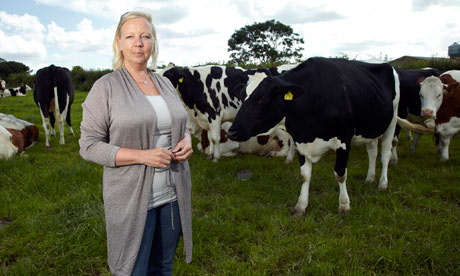
Mega-dairy factory farms are economically unsustainable
There is no denying our dairy industry is in desperate need of economic turnaround, but we must support small-scale farms
- guardian.co.uk,
- Article history
Mega-dairy factory farms are too high risk and not a sound long-term option. Photograph: WSPA
There is a sector of Britain's business that is in serious crisis. Companies are going bankrupt or simply shutting down as they find themselves unable to profit.The sector in question trades on a basic staple: a raw product that isn't in short supply. If we don't act now to preserve it, then this relatively quiet crisis will be over before most of us realise it is happening.
One day we will look out of the window and ask what happened to our countryside, where our cows went and why we only have a few hundred massive factory dairies instead of thousands of dairy farms, shaping our landscape and rural life.
Ten years ago there were around 30,000 dairy farms in the UK.
Now, every day across Britain one of our 11,000 remaining dairy farmers is turning their back on dairy farming and selling off their herds. There is no denying that our dairy industry is in desperate need of an economic turnaround.
The farming industry is looking to the mega-dairies of the US and likes what it sees.
The grass may well seem greener, but look into the actual economics behind the large-scale, intensive, indoor system and the picture is far from rosy.
Farmers are too often told to expand their herd size and with it change the way they farm, under the belief that a greater economy of scale will solve all the problems.
But as we learned the hard way with the global banking crisis, the notion of "too big to fail" is a myth.
The basic requirement of a good business model is insulation from as much unnecessary risk as possible, while still making a profit. If you have a choice of high-risk for an average position in the marketplace, would you pick that over low risk for long-term gain?
Perhaps yes if you were opening a pop-up shop, or capitalising on a commodity that will only be around for a short period of time.
But when you apply those options to the British dairy industry, the high-risk option surely loses its appeal. In the dairy economics report published on Friday by the World Society for the Protection of Animals (WSPA), the mega-dairy is found to be a high-risk option, and I agree with them.
The potential for financial ruin is enormous when a good farmer (who may not be a good businessman) switches production methods to that of a massive US-style dairy farm.
When things go wrong it affects not just the business but the animals , and too much can go wrong with a mega-dairy for me to be comfortable with it as the future of UK dairy farming. Yes, farming is ultimately a business, but it is an emotive one that doesn't pay enough for those in the industry to be in it solely for the money, so we know they care about their animals.
We must lose the idea that mega-dairies mean more milk and therefore more profit. Consider instead the profit lines from animals that live longer, with fewer health issues.
Consider that this means avoiding early culling, so maintaining longer-term profit margins becomes a sustainable reality and, above all, a more palatable approach to dairy farming.
Because what are we faced with instead if we go down the mega-dairy route?
Two years ago I invested in a woollen mill in Somerset. The textiles industry was suffering as many people had shifted production to China, but I believed in their specialist knowledge. Now, demand has shifted back to products which need those dedicated skills to produce them, but sadly most of those skills were lost when the production was exported.
This is worth remembering as our dairy farmers and herdsman face being replaced with cheap labour and machinery.
Britain – like many countries – has tried liberal economics and deregulation of the markets. It allows for an incredible financial boom, but the following bust in the 1980s and 1990s and our current situation has become more devastating each time, with today's levels of unemployment at a record high.
Perhaps it is time for a more socially responsible approach?
Economists say that the most robust marketplace is one of many small-scale buyers and sellers, none of which can individually influence price. Reducing the number of dairy farms can only take us farther from the robust marketplace.
I suggest that our dairy industry deserves the chance to try something truly economically sustainable rather than going through a financial groundhog day and wondering where all the dairy farms went, 10 years from now. Let's change this quiet crisis into a loud revolution.
We all have a part to play in this – if we don't support our small-scale dairy farmers now, tomorrow will be too late.
• Deborah Meaden is an entrepreneur and an investor on the BBC programme Dragons' Den
Source: http://www.guardian.co.uk/environment/2011/sep/09/mega-dairy-farms-unsustainable
No comments:
Post a Comment